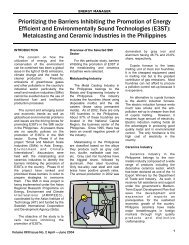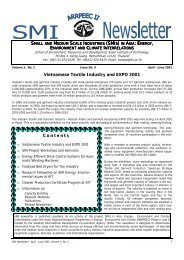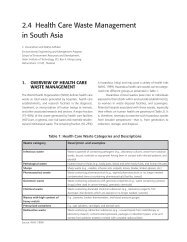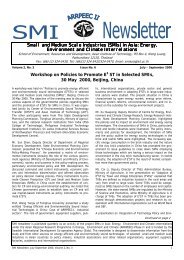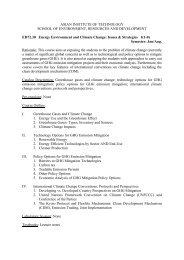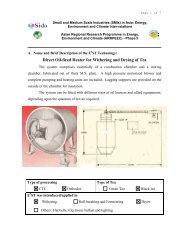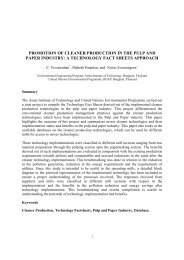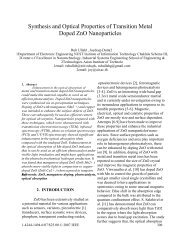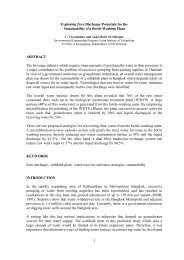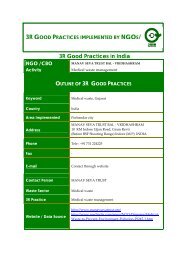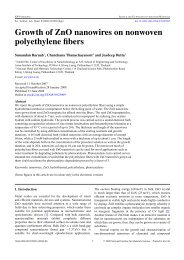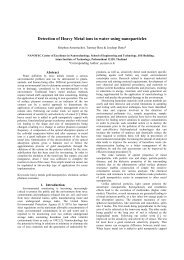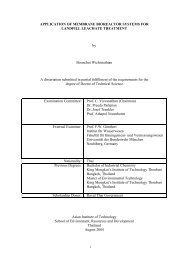A Gap Analysis in Selected Asian Countries, 3R Knowledge Hub ...
A Gap Analysis in Selected Asian Countries, 3R Knowledge Hub ...
A Gap Analysis in Selected Asian Countries, 3R Knowledge Hub ...
You also want an ePaper? Increase the reach of your titles
YUMPU automatically turns print PDFs into web optimized ePapers that Google loves.
nationwide. Malaysia has plans to set-up more<br />
<strong>in</strong>c<strong>in</strong>erators to deal with mount<strong>in</strong>g piles of<br />
waste <strong>in</strong> landfills. Strategic plans for solid waste<br />
management, compost<strong>in</strong>g, RDF, recycl<strong>in</strong>g of<br />
tyres and plastic are under research.<br />
The government relaunched its recycl<strong>in</strong>g<br />
campaign <strong>in</strong> 2000 target<strong>in</strong>g 22% of waste to be<br />
recycled by 2020. Compost<strong>in</strong>g is still be<strong>in</strong>g<br />
studied but not as a priority activity now. The<br />
Malaysian government’s plans to build solid<br />
waste <strong>in</strong>c<strong>in</strong>erators are dis<strong>in</strong>centives for<br />
communities to practice waste reduction.<br />
Without relevant legislations and proper<br />
enforcement, the country is fac<strong>in</strong>g difficulties <strong>in</strong><br />
implement<strong>in</strong>g waste reduction programs.<br />
In order to formulate Action Plans for the<br />
Federal and Local Governments and Guidel<strong>in</strong>es<br />
to Promote Waste M<strong>in</strong>imization <strong>in</strong> l<strong>in</strong>e with the<br />
National Strategic Plan for Solid Waste<br />
Management <strong>in</strong> Malaysia, a jo<strong>in</strong>t study was<br />
launched by the Government of Malaysia and<br />
the Government of Japan. The M<strong>in</strong>istry of<br />
Hous<strong>in</strong>g and Local Government has also taken<br />
the lead <strong>in</strong> promot<strong>in</strong>g and establish<strong>in</strong>g<br />
recycl<strong>in</strong>g systems. However, despite the<br />
government’s efforts data shows that the rate of<br />
recycl<strong>in</strong>g of solid waste rema<strong>in</strong>s at about 2 to<br />
5% per year.<br />
HEALTHCARE WASTE<br />
As of 2003, Malaysia had 118 government<br />
hospitals and healthcare centers (28,500 beds),<br />
seven special medical <strong>in</strong>stitutions (6,300 beds)<br />
and 220 private hospitals (9,000 beds). On an<br />
average, a waste generation rate of 1.9 kg/bed/<br />
day has been reported.<br />
Malaysia’s healthcare waste management was<br />
privatized <strong>in</strong> 1995. A number of regional and<br />
on-site medical waste <strong>in</strong>c<strong>in</strong>erators were built.<br />
Currently there are five regional medical waste<br />
<strong>in</strong>c<strong>in</strong>erators with different capacities of 20 to<br />
500 kg/hr. Three more <strong>in</strong>c<strong>in</strong>erators with<br />
capacities of 200 kg/hr have been planned and<br />
are yet to be built. There are seven small on-site<br />
healthcare waste <strong>in</strong>c<strong>in</strong>erators with 20kg/hr and<br />
50kg/hr capacities.<br />
Follow<strong>in</strong>g the Healthcare Waste Management<br />
Plan 2005 developed by the M<strong>in</strong>istry of Health,<br />
Pen<strong>in</strong>sular Malaysia was divided <strong>in</strong>to three<br />
healthcare waste management zones. Each zone<br />
was contracted a concession to a private<br />
company for 15 years. With<strong>in</strong> the concession<br />
zone, the private contractor was required to<br />
provide b<strong>in</strong>s and bags for primary and<br />
secondary collection, storage, external transport,<br />
and a central localized <strong>in</strong>c<strong>in</strong>erator for special<br />
healthcare waste generated at the hospitals.<br />
F<strong>in</strong>d<strong>in</strong>gs<br />
Healthcare waste management <strong>in</strong> Malaysia was<br />
privatized with <strong>in</strong>c<strong>in</strong>eration facilities adher<strong>in</strong>g<br />
to the standards for emissions to those of the<br />
European Union. Lack of published and<br />
reliable <strong>in</strong>formation on recycl<strong>in</strong>g activities and<br />
other green practices <strong>in</strong> the hospitals has been a<br />
major issue h<strong>in</strong>der<strong>in</strong>g decision-mak<strong>in</strong>g at the<br />
country level. It could be observed that<br />
<strong>in</strong>c<strong>in</strong>eration is the preferred mode of dispos<strong>in</strong>g<br />
healthcare wastes <strong>in</strong> the country with an<br />
uncerta<strong>in</strong>ty on the efficiency of the systems<br />
though. Hospital Lam Wah EE has set an<br />
example for the rest health sectors with<strong>in</strong> the<br />
country <strong>in</strong> recycl<strong>in</strong>g its waste.<br />
Hospital Lam Wah EE Staff attend<strong>in</strong>g its waste<br />
Image source: Hospital Lam Wah EE<br />
Chapter 3: Country <strong>Analysis</strong><br />
91




